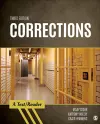
Corrections: A Text/Reader
3 authors - Paperback
£133.00
Francis T. Cullen is Distinguished Research Professor Emeritus and Senior Research Associate in the School of Criminal Justice at the University of Cincinnati, where he also holds a joint appointment in sociology. He received a Ph.D. (1979) in sociology and education from Columbia University. Professor Cullen has published over 300 works in the areas of criminological theory, corrections, white-collar crime, public opinion, and the measurement of sexual victimization. He is author of Rethinking Crime and Deviance Theory: The Emergence of a Structuring Tradition and is coauthor of Reaffirming Rehabilitation, Corporate Crime Under Attack: The Ford Pinto Case and Beyond, Criminology, Combating Corporate Crime: Local Prosecutors at Work, Unsafe in the Ivory Tower: The Sexual Victimization of College Women, Correctional Theory: Context and Consequences. Environmental Corrections: A New Paradigm for Supervising Offenders in the Community, and Communities and Crime: An Enduring American Challenge. He also is coeditor of Criminological Theory: Past to Present—Essential Readings, Taking Stock: The Status of Criminological Theory, The Origins of American Criminology, the Encyclopedia of Criminological Theory, The Oxford Handbook of Criminological Theory, The Oxford Handbook of White-Collar Crime, The American Prison: Imagining a Different Future, Challenging Criminological Theory: The Legacy of Ruth Rosner Kornhauser, Sisters in Crime Revisited: Bringing Gender Into Criminology, Delinquency and Drift Revisited: The Criminology of David Matza and Beyond, Deterrence, Choice, and Crime: Contemporary Perspectives. Professor Cullen is a Past President of the American Society of Criminology and of the Academy of Criminal Justice Sciences. In 2010, he received the ASC Edwin H. Sutherland Award. In 2013, he was honored by his alma mater, Bridgewater State University, with a Doctorate in Public Service. Cheryl Lero Jonson is Assistant Professor in the Department of Criminal Justice at Xavier University. She received a Ph.D. (2010) in criminal justice from the University of Cincinnati. She is coeditor of The Origins of American Criminology, Sisters in Crime Revisited: Bringing Gender into Criminology, The American Prison: Imagining a Different Future, and Deterrence, Choice, and Crime: Contemporary Perspectives. Her published work has appeared in Criminology and Public Policy, Crime and Justice: A Review of Research, and Victims and Offenders. Her current research interests include correctional policy, the impact of incarceration on recidivism, the use of incentives to downsize American prisons, inmate adjustment to conditions of confinement, strategies to prevent school shootings, and work reactions among criminal justice employees. From 2012 to 2015, she served as an Executive Counselor of the Corrections Section of the Academy of Criminal Justice Sciences. Mary K. Stohr is a professor in the Department of Criminal Justice and Criminology at Washington State University. She received a PhD (1990) in political science from Washington State University, with specializations in criminal justice and public administration. Many moons ago, and before she earned her graduate degrees, she worked as a correctional officer and then as a counselor in an adult male prison in Washington State. Professor Stohr has published more than 100 academic works in the areas of correctional organizations and operation, correctional personnel, inmate needs and assessment, program evaluation, gender, policing, victimization, and drug policy outcomes. Books coauthored with others include The American Prison (with Cullen and Jonson); Corrections: The Essentials (with Walsh); Correctional Assessment, Casework and Counseling (with Walsh); Corrections: A Text Reader (with Walsh and Hemmens); Criminal Justice Management: Theory and Practice in Justice-Centered Organizations (with Collins); and The Prison Experience (with Hemmens). She was the executive director of the Academy of Criminal Justice Sciences (ACJS) for 5 years, received the Fellows Award from ACJS in 2018, received the Founders Award in 2009, and is a cofounder of the Corrections and Minorities and Women Sections of ACJS.